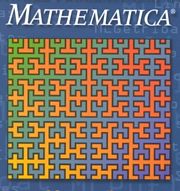
|
FreeComputerBooks.com
Links to Free Computer, Mathematics, Technical Books all over the World
|
|
- Title: Mathematica® Programming: an Advanced Introduction
- Author(s) Leonid Shifrin
- Publisher: mathprogramming-intro.org; eBook (Creative Commons Licensed)
- License(s): Creative Commons License (CC)
- Hardcover: N/A
- eBook: PDF, ePub, etc.
- Language: English
- ISBN-10: N/A
- ISBN-13: N/A
- Share This:

|
This book does a good job of showing the wide range of capabilities of the Mathematica program, helps you master the application's core principles by walking you through real-world problems. Ideal for browsing, this book includes recipes for working with numerics, data structures, algebraic equations, calculus, and statistics.
About the Authors- N/A

- Mathematica® Programming: an Advanced Introduction (Leonid Shifrin)
- The Mirror Site (1) - PDF
- The Mirror Site (2) - PDF
-
 Power Programming with Mathematica® (David B. Wagner)
Power Programming with Mathematica® (David B. Wagner)
This book unpacks Mathematica® for programmers, building insights into programming style via real world syntax, real world examples, and extensive parallels to other languages.
-
 An Introduction to Programming with Mathematica
An Introduction to Programming with Mathematica
Starting from first principles, this book covers all of the foundational material needed to develop a clear understanding of the Mathematica language, with a practical emphasis on solving problems.
-
 Mathematica® and the Raspberry Pi (Roland Jugandi)
Mathematica® and the Raspberry Pi (Roland Jugandi)
Mathematica is very powerful programming language and invaluable to anyone interested in engineering without cost. This ebook is for the novice just getting started with Mathematica and consists of worked examples.
-
 An Elementary Introduction to the Wolfram Language
An Elementary Introduction to the Wolfram Language
This book provides an elementary introduction to the Wolfram Language and modern computational thinking. The Wolfram Language represents a major advance in programming languages that makes leading-edge computation accessible to everyone.
-
 Sage for Undergraduates (Gregory V. Bard)
Sage for Undergraduates (Gregory V. Bard)
This book is a gentle introduction to SageMath for undergraduate students toward the end of Calculus or higher-level course work such as Multivariate Calculus, Differential Equations, Linear Algebra, or Math Modeling.
-
 Sage Tutorial (William Stein)
Sage Tutorial (William Stein)
This tutorial is the best way to become familiar with SageMath in only a few hours. It explains how to use the free and open source mathematical software package Sage. Both binaries and source code are available for SageMath from the download page.
-
 Exploring Discrete Mathematics With Maple (Kenneth H. Rosen)
Exploring Discrete Mathematics With Maple (Kenneth H. Rosen)
This is is a supplement in discrete mathematics to concentrate on the computational aspects of the computer algebra system Maple. Detailed instructions for the use of Maple are included in an introductory chapter and in each subsequent chapter.
-
 Zero to MATLAB (Adam L. Lambert, PhD)
Zero to MATLAB (Adam L. Lambert, PhD)
The book is structured as a tutorial rather than a reference. The MATLAB documentation is extensive and so my focus will be to outline basic algorithmic thinking and MATLAB syntax with explicit examples.
-
 Scientific Computing with MATLAB (Paul Gribble)
Scientific Computing with MATLAB (Paul Gribble)
The goal of this book is to provide you with skills in scientific computing: tools and techniques that you can use in your own scientific research. We will focus on learning to think about experiments and data in a computational framework.
-
 Experiments with MATLAB (Cleve Moler)
Experiments with MATLAB (Cleve Moler)
This book provides an excellent initiation into programming in MATLAB while serving as a teaser for more advanced topics. It provides a structured entry into MATLAB programming through well designed exercises.
-
 Numerical Computing with MATLAB (Cleve B. Moler)
Numerical Computing with MATLAB (Cleve B. Moler)
This book is a lively textbook for an introductory course in numerical methods, MATLAB, and technical computing. It helps readers learn enough about the mathematical functions in MATLAB to use them correctly, and modify them appropriately, etc.





